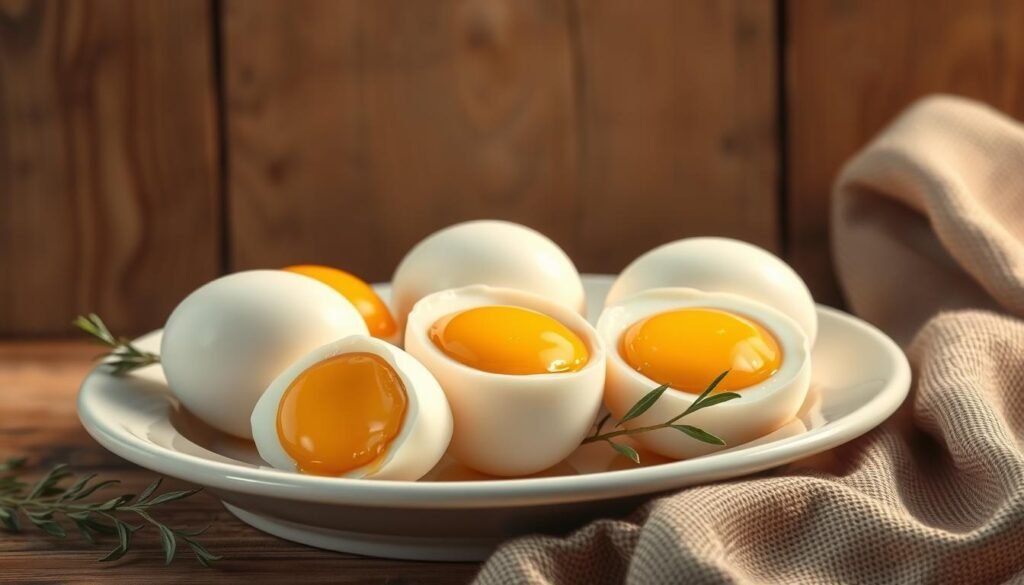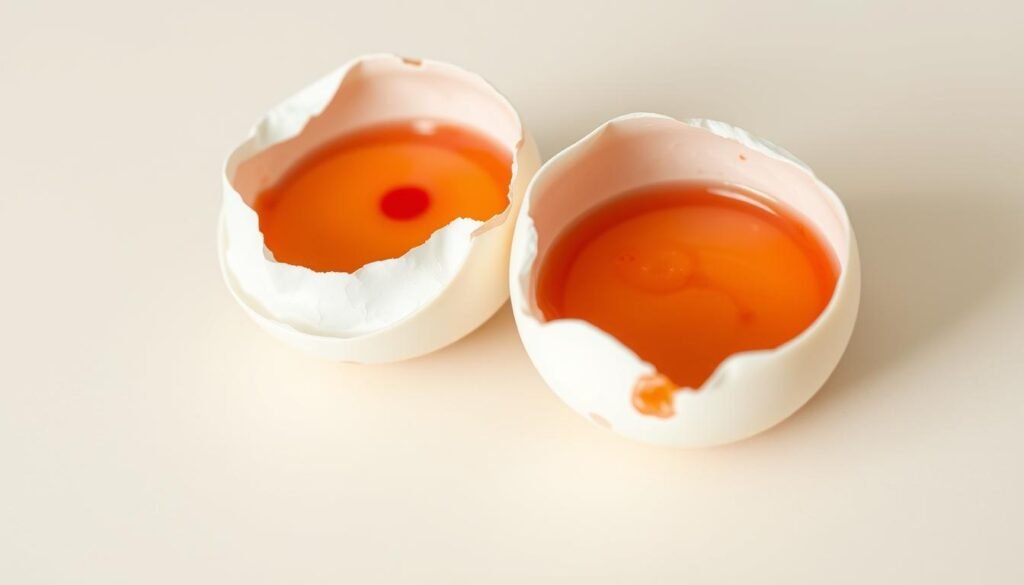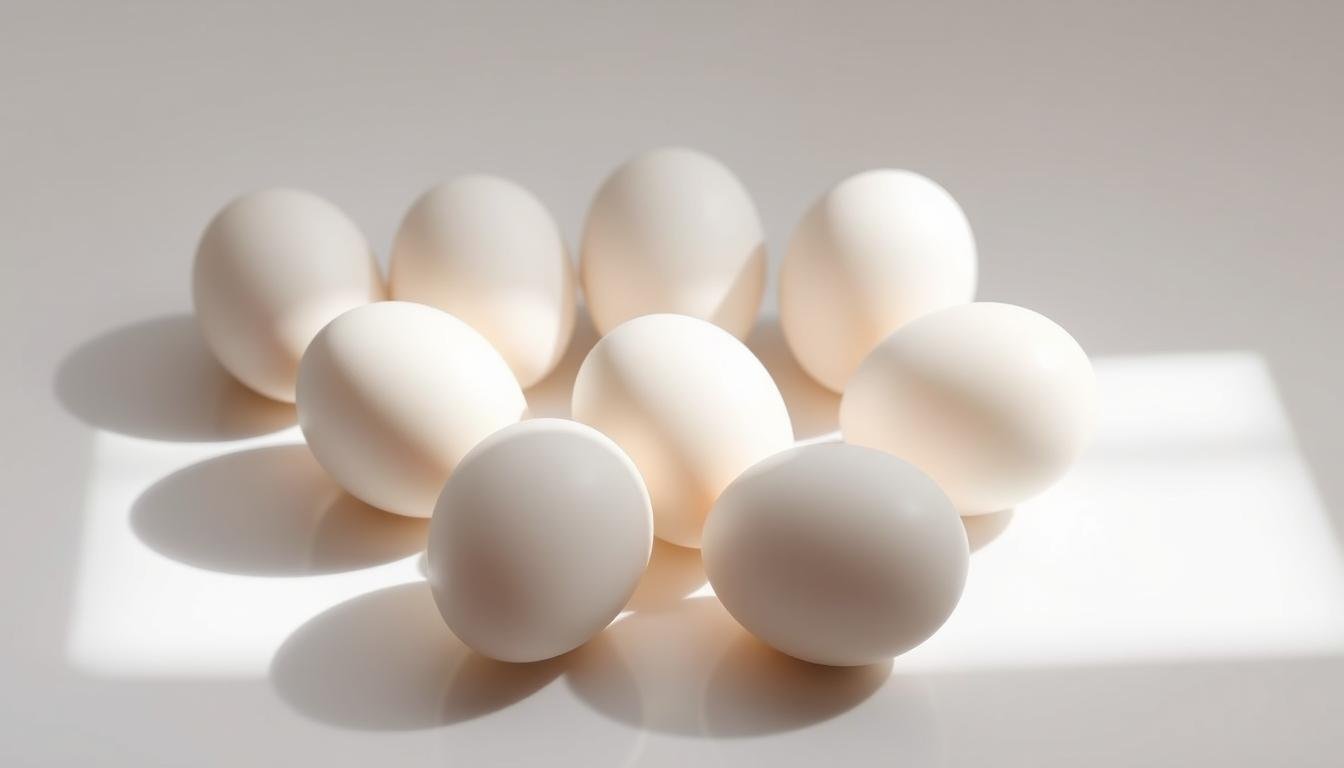I’ve often wondered if Muslims can eat eggs without doubt. Eggs are a common food for many of us. They’re scrambled for breakfast, baked in cakes, or hidden in sauces. But is it okay to eat them according to Islam?
Eggs in Islam are interesting because they mix nutrition and faith. We look at chicken eggs and others like quail or ostrich. Their okay-ness depends on Islamic rules. But what makes eggs halal? And how do we choose the right ones in today’s world?
Some of us wonder if we can eat eggs from farms or if caviar or blood-spotted yolks are okay. The answers come from old teachings and science. Let’s explore together the rules on birds, reptile eggs, and why eggs are good for us when we get them right.
Understanding Halal Food Principles in Islam
Islamic dietary laws guide over 1.9 billion Muslims daily. They ensure food is in line with divine guidance and avoids harm. The Quran says in Al-Baqarah 2:168:
“Eat of the good things We have provided for you.”
Definition of Halal in Islamic Dietary Laws
Halal means food that is not forbidden by scripture. The A-B-C-D framework explains what is not allowed: Alcohol (A), blood (B), carnivores (C), and improperly slaughtered animals (D). Eggs and plants are naturally okay but can become forbidden if contaminated.
Scholars focus on how food is prepared and its purity. This includes even processed foods.
The Importance of Halal Food for Muslims
Following halal is a way to worship and strengthen faith. It also brings Muslims together. Choosing certified halal products shows respect for divine commands and ethics.
The global halal market is expected to hit $3 trillion by 2028. This shows the commitment to halal standards.
SSources of Islamic Rulings on Food Permissibility
Quranic verses like Surah Al-Ma’idah 5:3 give basic rules. The Prophet’s actions (sunnah) help explain these rules. Scholarly agreement (ijma) and reasoning (qiyas) address new issues.
This method keeps halal food standards strong while adapting to new situations.
Can Muslims Eat Eggs? The Islamic Verdict
Islamic teachings say can muslims eat eggs is a yes. Eggs from chickens and ducks are okay. The Quran doesn’t say no, so they’re good to go.
Many scholars agree. They say eggs from birds like geese or turkeys are fine. Even if the bird was not slaughtered right, its eggs are okay.
Malikis and Hanbalis also agree. They say birds that eat plants and bugs are okay. But birds like eagles or vultures are not.
In Malaysia, they check if chickens eat plants. This makes sure the eggs are pure. Muslims around the world enjoy eggs in different ways.
But, eggs from pigs are not allowed. Eggs from common birds are fine.
Today’s scholars like Muhammad Al-Uthaymeen say eggs are mostly okay. They say a little blood doesn’t make the egg bad. But, if the egg looks really different, it’s best to avoid it.
The Natural Origin of Eggs and Their Halal Status
Eggs are special in eggs in Islam because they are both healthy and studied a lot. Allah made them as part of Earth’s gifts. They fit with Islamic teachings about eating good foods (tayyibat) that help our bodies and souls.
Because eggs come from birds like chickens and ducks, they don’t need the same rules as meat. This makes them easier to eat.

Eggs as Natural Food Sources
Eggs are very good for us. They have 6.3g of protein, vitamin D, and choline. These help our bones and brain.
The Quran talks about eating foods that keep us alive. Even though eggs in Quran aren’t mentioned, eating them is okay if they are from good sources.
Quranic References Related to Food from Animals
The Quran gives big rules, not just lists. Surah An’am 6:118-119 says we can eat foods that help us. Eggs are not mentioned, but they don’t need special slaughter rules.
This makes them easy for Muslims to eat everywhere.
Scholarly Consensus on Eggs
Most scholars agree: eggs from birds that don’t hunt are okay to eat. Hanafi scholars say eggs are fine, even from hens that haven’t laid them. They see eggs as different from meat.
This view matches science too. Eggs have amino acids and antioxidants. They are a gift from Allah for our health and well-being.
Different Types of Eggs and Their Permissibility
Islamic teachings say eggs are halal based on their source. Let’s look at which ones are okay and why.
Chicken Eggs Halal
Chicken eggs are definitely halal. They come from birds like chickens, turkeys, and quails. These birds are all okay to eat.
Chicken eggs are full of protein and calories. They are good for Muslims to eat. Even eggs found inside slaughtered hens are okay, according to some rules.
Duck, Quail, and Other Bird Eggs
Eggs from ducks, geese, and quails are also halal. Scholars agree that eggs from non-predatory birds are fine. But, eggs from birds of prey like eagles and hawks are not allowed.
Eggs from amphibians or reptiles, like turtle roe, are also not okay. This rule helps follow the Quran’s rules on food.
Fish Eggs Halal
Fish eggs are halal because of Islamic rules on seafood. Caviar and tobiko are okay because fish don’t need special slaughter. The Quran says all seafood is fine, so their eggs are too.
This means Muslims can eat sushi with fish eggs. It’s good to know these rules to follow your diet.
Potential Concerns About Commercial Egg Production
Choosing eggs is more than just checking if they are halal. Factory farming eggs often go against ethical standards. The egg industry is mostly secret, which makes people wonder if it follows Islamic values of kindness and fairness.
“The conditions in which chickens live directly impact the integrity of the food they produce,” explains food ethicists. This idea matches Quranic teachings about caring for creation (Quran 2:27). Be guardians of prayer and fear Allah).
Today’s halal certification mainly looks at how animals are killed. But it doesn’t check how they live. Most U.S. eggs come from places where hens have less room than an iPad. This goes against the Prophet’s (PBUH) teachings against hurting animals.
Recent events like the 2023 bird flu at Cal-Maine Foods show the risks of big farms. They had to kill 1.6 million birds. This shows how big farms can fail.
Food safety is also a big worry. Salmonella causes 20% of U.S. cases linked to poultry. Cage-free farms had more contamination than regular ones. But it’s not just about being safe—it’s about being right.
More than 40% of people now want better choices. They want farms that treat animals well and follow modern standards.
So, does halal certification mean eggs are okay to eat? The answer is no. Muslims should look for producers who care about mercy and purity. These values are as important as the food itself.
Checking for Blood Spots in Eggs: Islamic Perspective
Eggs with blood spots sometimes make people wonder if they are halal. Let’s look at this through Islamic eyes. Blood spots in eggs are okay, but knowing why they happen helps us make good choices.

What Causes Blood Spots in Eggs
Blood spots happen when blood vessels break during egg making. It’s a natural thing, not a sign of life. The Quran says eggs are okay unless they have bad stuff in them. These spots don’t make the egg haram because they come from a normal process.
Scholarly Opinions on Eggs with Blood Spots
Most scholars say eggs with blood spots are fine. The blood is not moving, which is okay according to Islamic law. A scholar said, “The egg’s purity isn’t changed by these spots” (Islamic Jurisprudence Manual, 2022). p. 145).). If you want, you can take out the spot, but it’s not required.
Practical Guidelines for Muslim Consumers
Look at eggs before you use them. If you find a spot, you can take it out or eat the egg as it is. This follows the Quran’s rule of making things easy. If you’re extra careful, choose eggs from trusted places or throw away spotted ones. Remember, what you eat is up to you and what you know. There’s no one rule for all Muslims.
Eggs in Processed Foods: What Muslims Should Watch For
As Muslims, we must be careful with processed food with eggs. Many foods have eggs hidden under names like “albumin” or “ovalbumin”. We need to check these ingredients closely. The core principles of halal tell us to look at every ingredient, not just meat.
Halal food certification ensures products are free from pork, alcohol, and questionable additives — a safeguard for conscious consumption.
Hidden Egg Ingredients in Processed Foods
Breads, pastas, and mayonnaises often have egg derivatives. Even “eggless” products might use lecithin from eggs. Always check labels for terms like “egg solids” or “egg white proteins.”
Cross-Contamination Concerns
Manufacturing lines shared with pork-based gelatin or alcohol pose risks. Over 80% of processed items risk cross-contact, per industry reports. Halal-certified brands like IFANCA or MCG ensure isolation from haram sources.
Reading Food Labels as a Muslim Consumer
Look for halal food certification seals and avoid additives like E120 (derived from insects). The egg consumption for Muslims is okay if there’s no haram cross-contamination. For example, check emulsifiers like MAG/DAG for their origins.
Remember: 46% of gelatin comes from pigs, so scrutinize “gelatin” listings. By choosing certified brands and clear labeling, we protect our choices and uphold halal standards.
Ethical Considerations: Free-Range vs. Factory-Farmed Eggs
Islamic teachings stress al-ihsan (excellence) and rifq (gentleness). These values apply to how we treat animals. Eggs are halal, but how they’re made is a big deal. Factory farming eggs come from cramped cages and debeaking. This is different from free-range systems that let animals roam.
Does this align with the Prophet’s words on treating all living beings with kindness?
“The Prophet Muhammad (peace be upon him) condemned cruelty to animals, saying, ‘A woman was punished because she imprisoned a cat until it died.’”
Factory farming eggs are everywhere, like the Arab Qatari Company’s 60 million eggs a year. But their methods don’t match Islamic values. Scholars say food must be not just halal but also ethically sourced.
The EU banned unstunned slaughter but ignores bigger issues like hens living up to 12 months in factory farms. How can we show rifq in our daily lives?
Looking after the environment is key too. Industrial egg farming leads to too much antibiotic use. In the U.S., 80% of antibacterial drugs are for animals. Choosing free-range eggs is a step towards caring for our planet.
Halal certification is important, but so is thinking about how animals are treated. As buyers, we can pick brands that care about animal welfare. This way, we can follow our faith and our conscience.
Incorporating Eggs Into Your Halal Diet With Confidence
Eggs are great for any diet, including those that follow Islamic rules. For Muslims, eating eggs is okay if they are halal. Halal eggs don’t need special slaughter because they come from birds, not animals.
Today, people choose food that’s good for them and right for their beliefs. In Cairo, vegetarian Muslims look for halal proteins like eggs. This choice helps them follow their faith and stay healthy. Always check labels to make sure they are halal, avoiding things like pork gelatin or alcohol.
Halal groups are now giving clear rules for food. Places like USC offer halal chicken and eggs, helping students. The global halal market is huge, over $1.9 trillion, thanks to clear labels. For more on halal living, check out Sharia-compliant guidelines online.
Eggs are also part of ethical food talks, with many wanting free-range eggs. Eggs are versatile and can be scrambled, baked, or eaten as a protein. By knowing about certifications and how eggs are made, Muslims can enjoy them while staying true to their faith and health.
FAQ
Are all eggs considered halal for Muslims?
What does halal mean in terms of food consumption?
Is there a difference between halal and tayyib?
Are eggs from birds that are not slaughtered in accordance with Islamic law halal?
What kind of eggs are haram?
How do I determine if processed foods containing eggs are halal?
What should I know about blood spots in eggs?
Why are ethical considerations important in egg consumption?
What are the nutritional benefits of eggs in an Islamic diet?
Can vegetarian or hormone-treated eggs be consumed?

Embracing Faith, One Insight at a Time!
The teachings of the Quran have always guided my path. With a deep passion for Islamic knowledge, I strive to blend the wisdom of tradition with the relevance of today, making the timeless messages of Islam accessible and meaningful for everyone.
Muslim Culture Hub is my platform to share historical insights and thought-provoking articles, exploring both well-known and lesser-discussed aspects of Islamic culture and beliefs. My mission is to create an inclusive online space where everyone can learn, strengthen their faith, and connect with the profound message of Islam.
Join the journey!
May peace be upon you.








